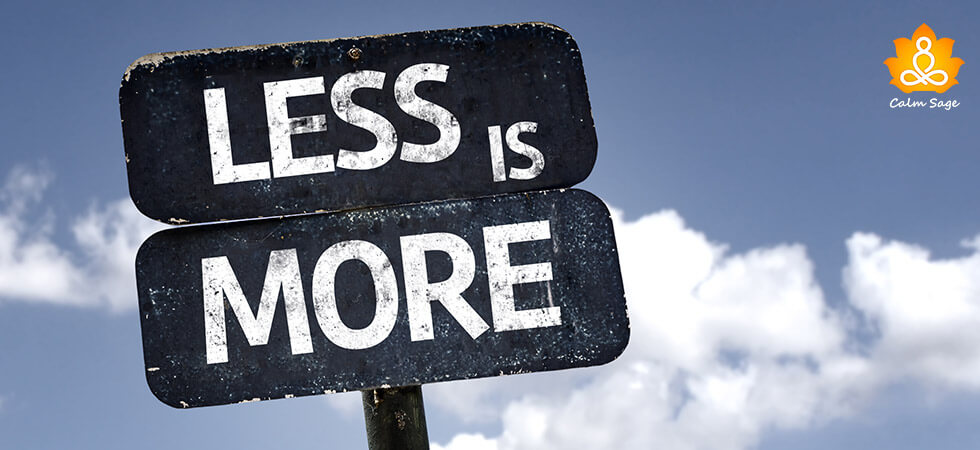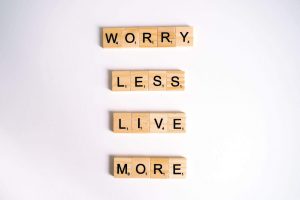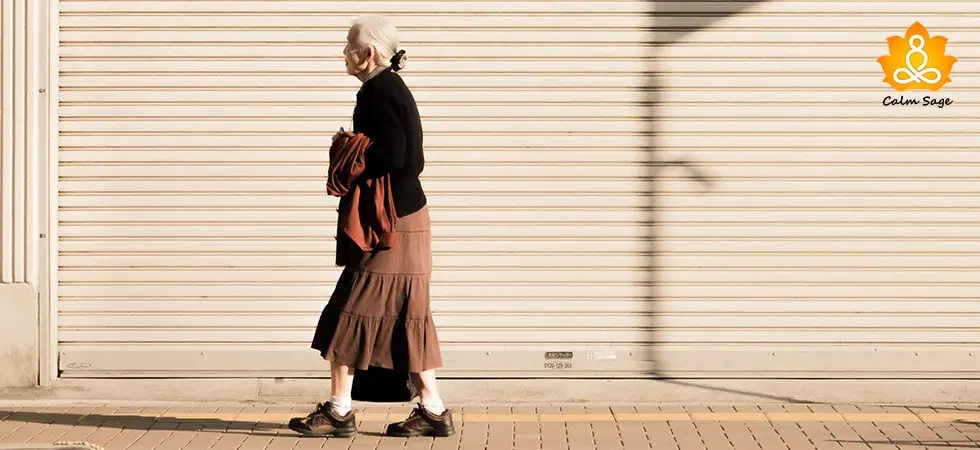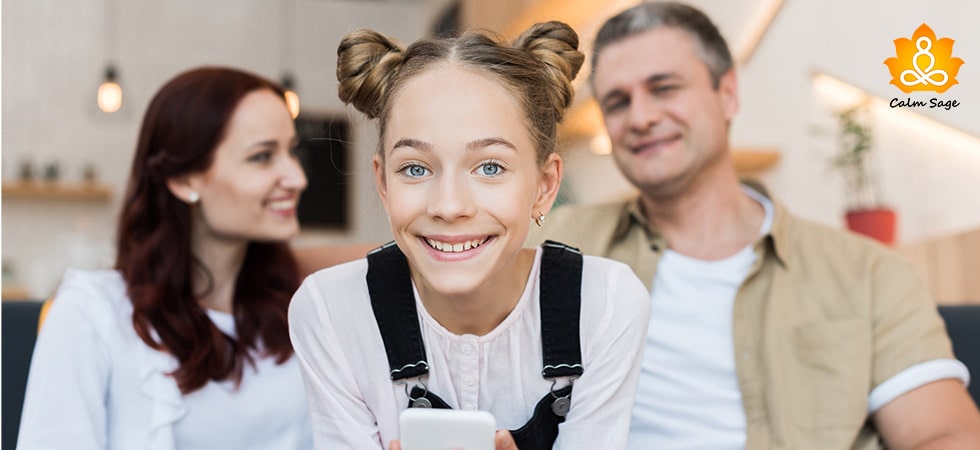Why Less Is More And Why It Should Be Your Mantra In Life

What is the first thing that comes to mind when you think of the phrase, “Less is more”? To me, less is more is “minimalism” in every way that counts. As we move forward in years, more and more people are embracing the concept of minimalism and simple living but is it the only thing that matters when it comes to less is more?
More is less, less is more… Before we dive into the crux of it, let’s take a look at the philosophy and psychology behind this phrase.
Did you know that you can trace the phrase, “less is more” back to 1855? Well, in a poem by Robert Browning, “Andrea Del Santo”, this phrase was first mentioned. However, as time moved on, this phrase was popularized in the works of a German-American architect, Ludwig Mies van der Rohe.
In today’s world, when “less is more” is mentioned, it’s often related to minimalism, a concept where you surround yourself with things that matter to you rather than material things that do not carry any sentimental value.
In this blog, let’s explore how and why less is more and how you can incorporate this concept in your life and why you should!
Reasons Why Less Is More – And Better!
Even this can fall on a spectrum! Are you the one who hoards everything that you find or are you the one who keeps things that hold value and donate or gives away the rest?
Hoarding is a mental health disorder that can make you accumulate things and then find it challenging to part from those excessively accumulated things. On the other hand, we have minimalists, who collect things that they need and get rid of what they don’t.
Many people often fall in between these two categories. But here, we’re talking about less is more so what benefits can you find when you own less?
Well, studies over the years have shown that organizing, cleaning, and minimizing clutter can boost your mental well-being, brighten your living space, and lessen your carbon footprints too.
Other reasons why less is better can be:
- When you have less clutter, you feel less overwhelmed and stressed
- Minimizing your living means you’re creating less waste and saving the environment
- A decluttered space can help improve your mental clarity and reduce unwanted distractions
- When you have less stuff, you have more space to be creative
- Less stuff can also mean more savings on finances
- When you have less stuff, you feel more grateful for the things you have and value
The power of “less is more” can’t be underestimated. And it’s tough. Wanting to follow and genuinely following the “less is more” philosophy can challenge your beliefs and values. We live in a consumer-centric society where we’re constantly told that having this and having that can make your living easy and bring you happiness.
Or sometimes, you may even feel that you need to hold on to some things otherwise you’re wasting their potential. However, it’s not true.
Coming from someone who’s moved three houses in two years, take my word; it’s not your things that make you happy or will keep you happy, it’s the relationships and memories you form and have that make it all worthwhile.
Sometimes, Less Is More:
Here are some more examples I could think of to help you understand how sometimes less is more and the best choice:
1. Less Spending, More Savings
Let’s start with financial advice! The first thing that comes to my mind when I say, less is more, is fewer expenses are equal to more savings. No one wants to be in debt so to avoid the situation from the get-go, save more and spend less. More and more savings will ensure fewer and fewer debts. So there you go!
2. Less Social Media, More Quality Time
Isn’t it easy to lose yourself in social media and forget to spend time with your loved ones? Well, social media can be a good source of entertainment but the more social media you use, the less you spend time with your family and friends. What’s more important; Social media, where almost everything is fabricated, or quality time with people who matter?
3. Less Stress, More Relaxation
We know how stress can affect our minds and bodies and the more stressed you feel, the less sleep and rest you’ll get. It’s good to take note of your stressors but also allow yourself to eliminate them to get the rest your mind and body need. The less stress you experience, the more relaxed you’ll be.
4. Less Planning, More Action
Planning is good but more planning can cause overthinking and when you overthink, you become stressed, and then to avoid stress, you plan – and thus begins a never-ending cycle. The less you plan and the more action you take can be good. It means that you get less time to feel overwhelmed and more time to accomplish things.
5. Less Diet, More Healthy Eating
Maybe the latest Keto diet you saw on Instagram works but what else are you going to lose? Diets can be good but less focus on diet and more on healthy (or mindful) eating are what you need. When you have control over what you’re eating and how you’re eating it, you gain more control over yourself and your health.
6. Less Stuff, More Grateful
When you have less stuff, especially the things you don’t truly need, you feel more grateful for everything you do have and need. When you express your gratitude, you can focus on what’s truly important. You can do this by writing in a gratitude journal. This way you’ll focus more on the positive things than the negative ones.
7. Less Talking, More Listening
I can’t stress more how listening is a skill that is more important than any other skill – in any relationship. When you talk less and listen more, you validate others’ feelings and make them feel heard. We can give advice but when you listen more, you engage the other person in a conversation and there’s nothing more appreciative than that.
8. Less Self-Doubt, More Self-Confidence
One of the most important traits to have is self-confidence but you might find that self-doubt often accompanies self-confidence. The fewer self-doubts you have or carry in your heart, the more confidence you’ll gain. Imagine what all you can achieve if you have less self-doubt and more confidence!
9. Less To Do, More Time For Yourself
One of the best parts of embracing “less is more” is that the less you spend time doing mindless things, the more you have time for yourself. This does not mean that you need to neglect your responsibilities, it just means that instead of doing things that are not a priority you can give yourself the time that you otherwise don’t have.
10. Less Worrying, More Mindful Moments
When you worry too much about your past or your future, the more you’ll miss the present moment. You can learn from your past and change the course of your future but not focusing on the present can be the biggest blow. So the less you dwell on the past or worry about the future, the more you’ll enjoy mindful moments of the present.
So Less Is More, But Where To Start?

Now that you know how less is more, take a look at how you can get started on following the concept too:
-
Begin With Decluttering
When you understand how less is more, you feel the need to get rid of some stuff. Well, I’m not telling you to spring-clean your house all at once. Start small. Declutter one room and then see how it helps (or doesn’t help) you. What else can you do then?
-
Avoid Buying New Stuff
Learn to cut back on buying things that you probably don’t need. For example, avoid buying more clothes and try to donate the ones you don’t wear anymore. If you find shopping harder to avoid, then you can do something else when the urge to buy new things strikes.
-
Challenge Yourself
If you believe that less is more, then start small. Challenge yourself to declutter one aspect of your life first. I started with my phone contacts. I began decluttering my phone by deleting the contacts I no longer needed. Challenge yourself with small things and go from there.
Decluttering doesn’t have to start immediately, it can start small. Try to understand the less is more philosophy, figure out how this concept helps you, and then move forward.
When you know that you can be happy and content with less, making “Less is more” a mantra shouldn’t be that hard.
So where do you think you fall on the spectrum? Are you a hoarder or a minimalist? Do you believe in less is more? Has the less philosophy helped you? Share your answers in the comments below.
You can also drop us an email at info@calmsage.com or DM us on social media. I hope this article helped you understand why less is more and why everyone should follow this.
Keep reading with us to learn more about such concepts!
Take Care!




















